


Similarweb Alternatives: Top Tools for 2025 for Startup Founders
The SaaS landscape in 2025 is a crucible of innovation, constantly reshaped by emerging technologies, most notably the pervasive influence of artificial intelligence. For startup founders, product builders, and ambitious indie hackers, simply having a great idea is no longer enough. Success hinges on a profound, almost intuitive, understanding of the market's pulse: identifying burgeoning trends, dissecting competitor growth trajectories, validating product ideas with precision, and seizing fleeting opportunities before they saturate. This dynamic environment demands a proactive and deeply data-driven approach to market research and competitive intelligence.
Traditional web analytics platforms, like Similarweb, provide a high-level panoramic view of internet traffic and audience demographics. While invaluable for established enterprises conducting broad market analysis, they often lack the granular, real-time SaaS-specific metrics and the targeted exploration capabilities crucial for nimble, early-stage ventures. In an era where precision and speed can dictate a startup's trajectory, founders require a sharper, more focused lens on market research and competitive tracking.
This guide explores a diverse range of platforms offering dashboard-based insights, revealing core growth metrics, and facilitating intuitive category Browse. These tools are all designed to arm founders with the intelligence needed to build and scale successfully in the fiercely competitive SaaS landscape of 2025.
The Evolving Imperative: Why Traditional Approaches Are Insufficient
The conventional toolkit for market analysis, while comprehensive in its scope, increasingly struggles to keep pace with the hyper-accelerated realities of a modern startup. A large volume of website traffic, for instance, offers only a superficial glimpse into the true health and underlying economics of a SaaS business. Founders grappling with the elusive challenge of achieving genuine product-market fit or endeavoring to carve out profitable niches require a fundamentally different caliber of data. They need insights that directly address recurring revenue streams, customer retention rates, and the nuanced, often exponential, growth patterns characteristic of a subscription-based model.
A founder's critical questions delve deeper than just traffic. Is that traffic converting into genuinely paying customers? Are those customers remaining loyal over time, indicating a sticky product and robust value? Is the product genuinely resonating within its highly specific vertical, signaling true product-market fit? Answering these necessitates a profound shift from static, domain-specific search queries to dynamic, exploratory data analysis. The focus must squarely be on actionable intelligence that directly informs product strategy, optimizes marketing spend, and identifies potential avenues for strategic pivots, all without overwhelming founders with irrelevant data.
Furthermore, a significant limitation of many general-purpose market analysis tools is their inherent bias towards larger, more established, and often publicly known entities. This leaves a substantial blind spot for the burgeoning and rapidly evolving landscape of early-stage SaaS and AI startups. It is precisely within these nascent, often overlooked spaces that the most disruptive opportunities frequently lie. Uncovering these hidden gems, however, demands a specialized approach to discovery. The contemporary founder requires tools that facilitate rapid discovery, enable rigorous product validation, and allow for precise competitive assessment, extending far beyond mere retrospective analysis. This calls for a diversified suite of tools, each excelling in a particular facet of market understanding, collectively empowering founders to make informed decisions at the speed of the market.
Navigating the Competitive Currents: Specialized Tools for Every Founder's Arsenal
In the intricate and fast-moving world of startup growth, founders require highly specific insights that generalized analytics tools often cannot deliver. The platforms detailed below each offer distinct yet complementary approaches to understanding the market, meticulously tracking competitors, and rigorously validating product ideas. Each tool plays a crucial role in different facets of a comprehensive competitive intelligence strategy.
Zeltadata: The Dashboard-First Approach to SaaS Performance
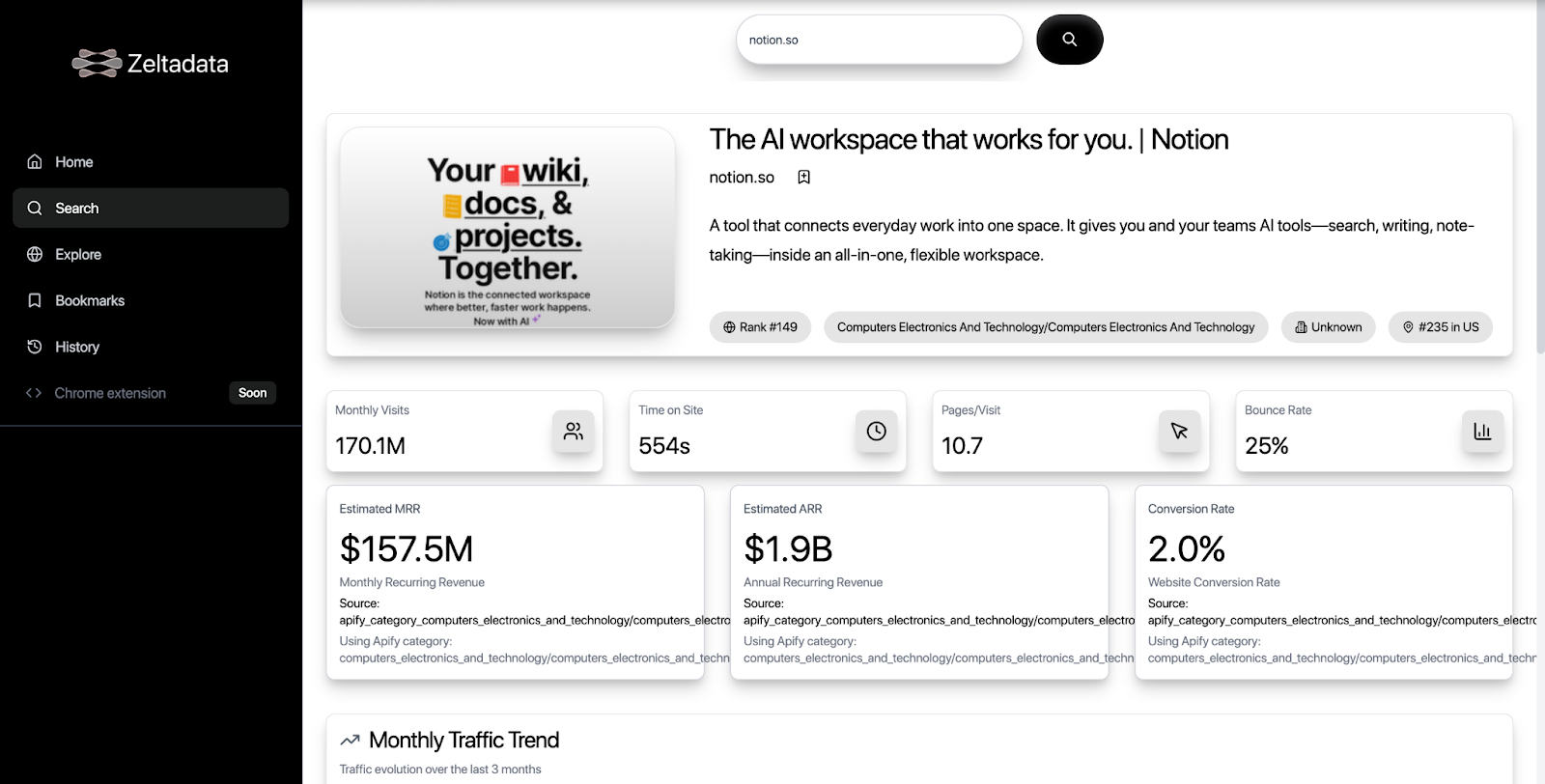
For founders deeply immersed in the B2B software and AI innovation sectors, gaining a clear, concise, and immediate picture of the market is paramount. Zeltadata shifts the paradigm from exhaustive web traffic reports to immediate, dashboard-centric insights into the actual, core performance of SaaS and AI SaaS companies. Unlike tools that primarily focus on digital traffic, Zeltadata prioritizes the underlying business mechanics.
Users can browse and filter entire categories, such as "Fintech AI SaaS" or "Developer Tool SaaS," to identify key players and their performance at a glance. This accelerated discovery dramatically reduces manual research, directing focus to building and iterating with data-backed conviction.
The platform concentrates on the most impactful metrics for recurring revenue businesses: Monthly Recurring Revenue (MRR), Annual Recurring Revenue (ARR), and Churn (when available). These indicators provide a real-time pulse on a SaaS company’s financial health, growth momentum, and customer retention. Zeltadata's design aims to facilitate rapid strategic decision-making, allowing founders to dedicate more time to building and iterating based on concrete market signals.
Semrush: Digital Marketing and SEO Insights

Semrush stands as a comprehensive platform for digital marketing, offering an extensive suite of tools for SEO, content marketing, PPC, and competitive research. For founders, its strength lies in analyzing competitor traffic sources, keyword strategies, and content performance.
It provides detailed organic research, allowing users to identify which keywords competitors rank for, their highest-performing pages, and estimated organic traffic. This information is profoundly valuable for identifying content gaps in your own strategy and pinpointing high-opportunity SEO keywords.
Furthermore, its PPC research capabilities reveal competitor ad strategies, showing which keywords they bid on, what their ad copy looks like, and their estimated ad spend. Semrush’s backlink analysis also helps understand competitor link-building efforts, informing your own outreach strategy.
Ahrefs: Backlink Analysis and SEO Depth
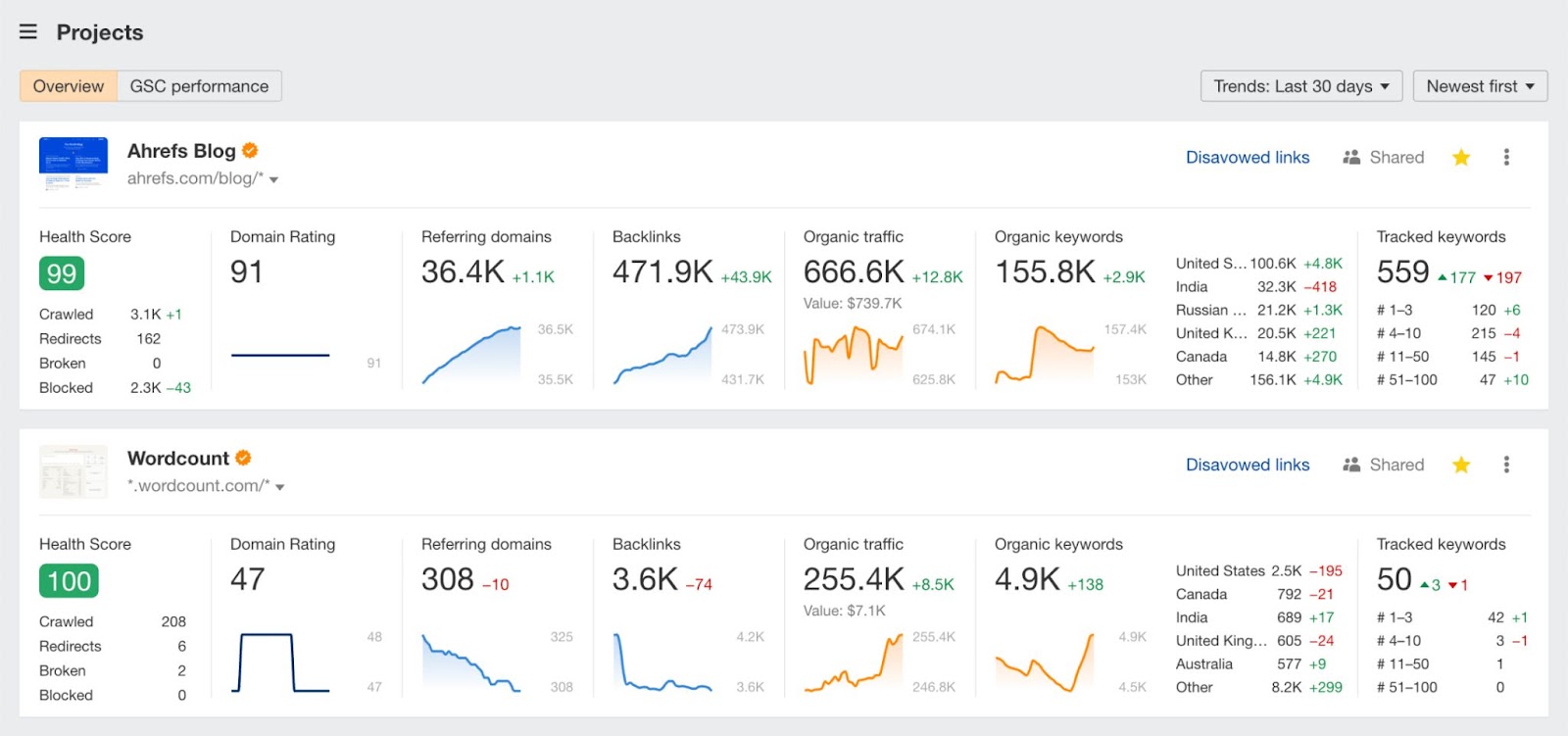
Often considered a close counterpart to Semrush, Ahrefs is another significant player in the SEO ecosystem, distinguished particularly by its vast and exceptionally well-indexed database of backlinks. For startups, Ahrefs offers a granular view into competitor SEO mechanics, enabling the identification of profitable keywords and the discovery of novel link-building opportunities.
Its Site Explorer feature provides a truly comprehensive overview of any website's organic search performance, including its estimated traffic value and the number of referring domains. The Keywords Explorer helps founders unearth new keyword ideas, meticulously analyze their ranking difficulty, and gain a profound understanding of the underlying search landscape for their niche.
Moreover, the Content Explorer is invaluable for finding high-performing content related to your specific industry, offering inspiration and data-backed guidance for your own content strategy and ideation. Ahrefs is particularly crucial for founders whose strategy heavily relies on driving organic traffic and establishing a dominant online authority.
Crunchbase: The Ecosystem Navigator for Funding and Companies

Crunchbase operates as an indispensable resource for understanding the broader startup and venture capital ecosystems. While it differs from direct analytics tools focused on traffic or revenue, its value lies in providing critical contextual information about companies, including their funding rounds, the investors backing them, and details about key personnel.
Founders routinely leverage Crunchbase for company discovery within specific industries, allowing them to find startups based on specific criteria such as funding stage or location. It’s an excellent tool for observing which sectors are currently attracting significant investment, identifying emerging trends in capital allocation, and tracking which companies are actively raising capital or expanding.
This platform helps in identifying potential competitors, both direct and indirect, by providing insights into their stated focus areas and their funding activities. While Crunchbase may not deliver real-time SaaS metrics, it provides a foundational layer of understanding regarding the financial health, strategic trajectory, and overall ecosystem positioning of companies, serving as a vital complement to more granular performance data.
G2 and Capterra: Unlocking the Voice of the Customer

For obtaining crucial qualitative insights into product-market fit and user satisfaction, platforms like G2 and Capterra are absolutely invaluable. These sites serve as comprehensive aggregators of user reviews, ratings, and comparative analyses for thousands of software products across nearly every category imaginable.
Founders can utilize these resources to gain direct, unfiltered access to customer sentiment. This means being able to discern what users genuinely appreciate about a competitor's product, where their persistent pain points lie, and what features or functionalities are consistently requested or criticized.
This wealth of user-generated feedback is gold for product validation and iterative refinement. It enables product builders to identify unmet market needs, anticipate and avoid common pitfalls, and build a product that genuinely resonates with and solves the real-world problems of their target audience.
Mixpanel: Granular Product Analytics for Internal Optimization
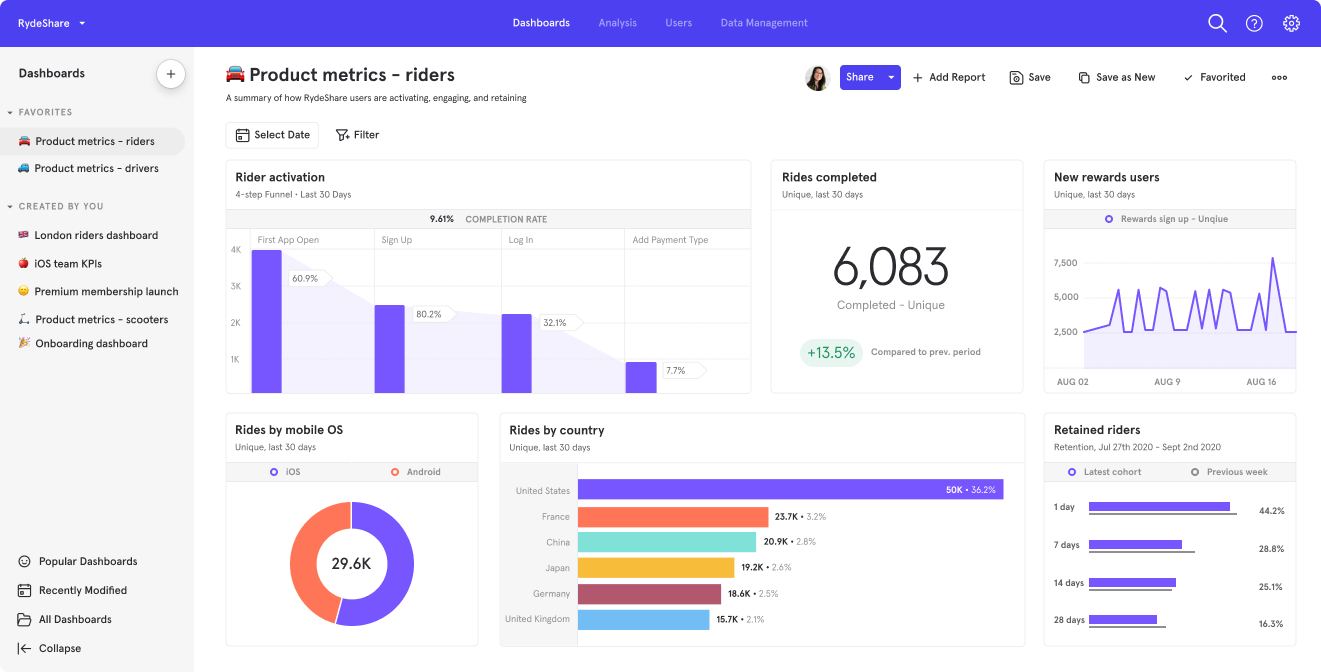
Mixpanel stands out as a leading product analytics platform, designed to provide founders with granular insights into user behavior within their own applications. While it doesn't offer external competitor analysis, its profound value lies in empowering you to optimize your own product's performance based on precise user interactions.
Founders employ Mixpanel to meticulously track feature adoption rates, analyze user conversion funnels, understand user retention across different cohorts, and pinpoint exact drop-off points within critical user journeys.
This deep dive into internal data intelligence is foundational for iterative product development, ensuring that new features are genuinely adopted and drive desired engagement. By understanding how users interact with your product, where they get stuck, and what features they frequently return to, Mixpanel allows for data-driven prioritization of development efforts, directly impacting your own core SaaS metrics like retention and monetization.
ChartMogul: Precision Analytics for Subscription Businesses

For any SaaS business, whether early-stage or scaling, accurately managing and understanding subscription data is non-negotiable. ChartMogul provides real-time, comprehensive SaaS analytics dashboards by integrating directly with your billing providers. Its singular focus is on delivering precise metrics for your own recurring revenue business.
Although it doesn't furnish competitor data, ChartMogul offers an unparalleled internal view of your own Monthly Recurring Revenue (MRR), Annual Recurring Revenue (ARR), churn rates, Customer Lifetime Value (LTV), and Average Revenue Per User (ARPU).
Founders rely on ChartMogul to gain a transparent understanding of their own growth engines, identify specific areas for improvement within their customer base (e.g., segmenting high-value customers, identifying churn risks), and generate accurate metrics essential for investor reporting or long-term strategic planning. Its specialized focus on internal SaaS financials makes it an absolutely critical tool for any subscription-based enterprise striving for sustainable growth.
SpyFu: Unmasking Competitor Search Strategies

SpyFu offers a powerful and direct lens into the paid and organic search strategies of your competitors. For founders who are running or planning ad campaigns, or those heavily invested in SEO, SpyFu can reveal invaluable tactical information.
This tool allows you to uncover virtually every keyword a competitor has bought on Google Ads, every ad variation they've tested, and their estimated monthly ad spend. This level of detail in PPC analysis can be a game-changer for optimizing your own advertising budget and discovering profitable keywords that your competitors are already leveraging.
On the SEO front, SpyFu provides insights into organic keyword rankings and estimated organic traffic. It’s particularly useful for identifying highly competitive keywords, dissecting successful ad strategies, and finding new opportunities to gain market share through search engine visibility. For any founder looking to compete effectively in the search landscape, SpyFu provides a crucial tactical advantage.
Brand24: Social Media and Brand Mentions Monitoring

Brand24 is a dedicated social listening tool that helps founders monitor online conversations about their brand, products, and crucially, their competitors. It tracks mentions across a vast array of online sources, including social media platforms, news sites, blogs, forums, and review sites.
This tool allows you to understand public sentiment, identify key influencers, and pinpoint trending discussions related to your industry. For competitive intelligence, Brand24 reveals how competitors are perceived online, the volume of discussion around their products, and any emerging crises or successes they might be experiencing.
By setting up alerts for competitor names or product keywords, founders can gain real-time insights into market perception and public discourse. This qualitative data is essential for reputation management, content strategy, and understanding the emotional landscape of your target market.
Exploding Topics: Foresight into Future Trends
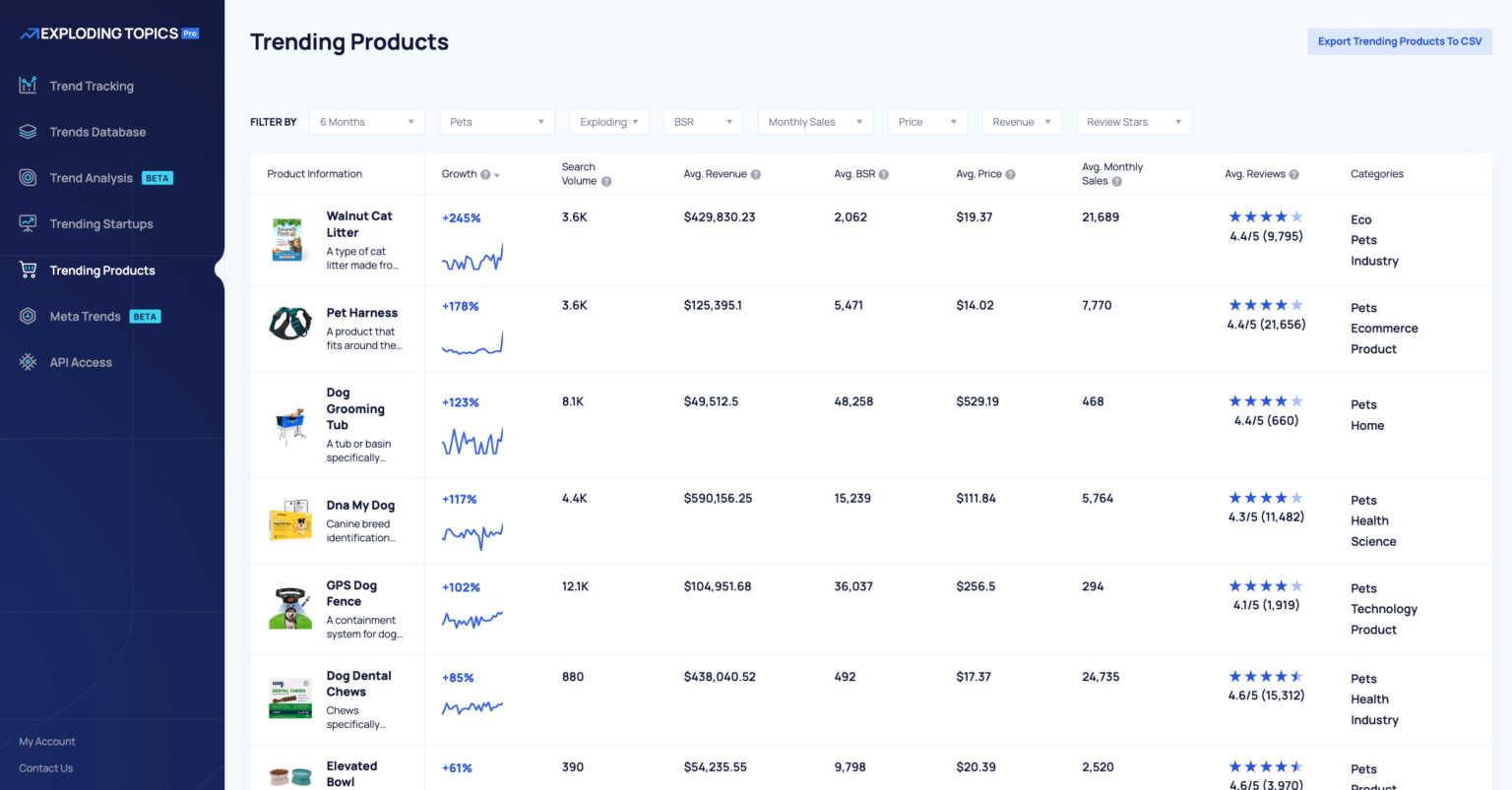
Exploding Topics is a unique tool specifically designed to help founders spot emerging trends before they go mainstream. It leverages AI and a team of analysts to identify rapidly growing topics, products, and industries, offering a significant advantage for early market entry.
Instead of looking at historical data, Exploding Topics focuses on identifying nascent interest signals across various online channels, from search queries to niche communities. This allows founders to validate new product ideas against real-time, forward-looking market interest.
By understanding what's about to become popular, founders can proactively develop solutions for future demand, rather than reactively competing in saturated markets. This tool is invaluable for strategic planning, product innovation, and identifying genuinely novel opportunities in the fast-paced SaaS and AI landscape.
The Strategic Imperative: Weaving Intelligence into Growth
Successfully navigating the startup journey in 2025 demands more than just a great product idea; it requires a sophisticated understanding of the market's dynamic pulse. Founders must embrace a continuous cycle of data-driven discovery, validation, and iterative refinement. This means moving beyond isolated data points to construct a holistic view of the competitive landscape and identify true windows of opportunity.
Spotting Emerging Trends and Niches with Precision
The ability to quickly identify and act on emerging trends is a significant competitive advantage. This goes beyond recognizing broad industry shifts; it involves spotting micro-trends within specific SaaS categories or identifying nascent AI tool growth. Tools that allow for dynamic filtering and dashboard-based exploration enable founders to see which specific product types are gaining traction fastest, what their core metrics look like, and whether there's an underserved segment ripe for disruption. This kind of early-stage tool discovery can prevent wasted development cycles and significantly accelerate product-market fit.
Benchmarking and Validation with Real-Time Data
For any startup, understanding how your performance stacks up against competitors is crucial. Are your MRR growth rates competitive? Is your churn rate sustainable compared to market leaders or emerging challengers? Tools that provide access to software startup benchmarks allow founders to validate their own assumptions and identify areas for improvement. This data-driven market validation helps refine your value proposition, optimize your pricing strategies, and ensure your product meets the demands of a discerning market. It’s about building with confidence, backed by verifiable metrics.
Building an Adaptive Competitive Tracking System
The market doesn't stand still, and neither should your competitive intelligence efforts. A robust system for competitor monitoring means continuously tracking shifts in competitor MRR, product launches, and digital strategies. This isn't a one-time exercise but an ongoing process that informs your strategic responses. Whether it's identifying a new feature from a competitor, noticing a surge in their growth data, or understanding changes in their user sentiment, an adaptive tracking system ensures you remain agile and responsive in a fast-paced environment. This allows founders to stay ahead of the curve, identify potential threats, and capitalize on new opportunities as they emerge.
The Iterative Loop of Product Development
Competitive intelligence isn't just for strategy; it deeply informs product development. By understanding what users love and hate about existing solutions (via review platforms), how users interact with similar products (through digital analytics), and what drives recurring revenue (via SaaS metrics), founders can design products that truly solve market problems. This creates an iterative loop where market insights directly feed into product enhancements, leading to better user experiences, higher retention, and stronger growth. It transforms the daunting challenge of launching and growing a tool in 2025 into a strategic game, played with clarity and confidence.
The Future of Growth: Intelligent Insights for Startup Builders
The era of making significant strategic decisions based on gut feeling or limited data is rapidly fading. For startup founders in 2025, the path to product-market fit and sustainable growth is increasingly illuminated by precise, actionable intelligence. The ability to ask and quickly answer critical questions about the market is no longer a luxury but a fundamental necessity for survival and scale.
Consider the unprecedented speed at which AI innovations are transforming industries. A founder needs to know not just if there's an AI tool in their space, but which ones are scaling rapidly, what their core value propositions are, and, crucially, what their underlying growth metrics actually look like. Is their MRR showing consistent upward trends, indicating strong market acceptance? Are they retaining customers effectively, signifying true product stickiness? These are the genuine signals of product-market fit and viable market opportunity. The emphasis has irrevocably shifted from simply finding scattered information to actively exploring, interpreting, and integrating dynamic data from multiple sources.
The strategic integration of tools that offer comprehensive views of digital presence, user sentiment, and critically, the core financial health of SaaS businesses, empowers a level of foresight previously unattainable. This multi-faceted approach allows for a data-driven market validation process that systematically reduces risk, enabling founders to make calculated bets rather than blind leaps. By leveraging a strategic combination of platforms, founders can effectively track SaaS revenue growth, discover new software tools by efficiently filtering categories, and identify early-stage opportunities based on live, evolving data. This interconnected intelligence facilitates faster pivots, more informed product iterations, and significantly increases the probability of launching with strong product-market fit.
The founders who truly thrive and define the market in 2025 will be those who master the art of competitive intelligence in its broadest sense. They will understand how to judiciously utilize tools that allow them to filter startup tools by category, accurately track AI tool growth with specific, verifiable metrics, and continually monitor software startup benchmarks against a backdrop of constantly changing market dynamics. This deep, ongoing engagement with comprehensive market data transforms the daunting challenge of launching and scaling a startup into a strategic game, played with clarity, confidence, and a decisive edge. In this intensely dynamic landscape, success is built not just on innovation, but on intelligent, timely insights into the very pulse and future direction of the market. This integrated approach to competitive intelligence is quickly becoming the non-negotiable foundation for any ambitious software venture.
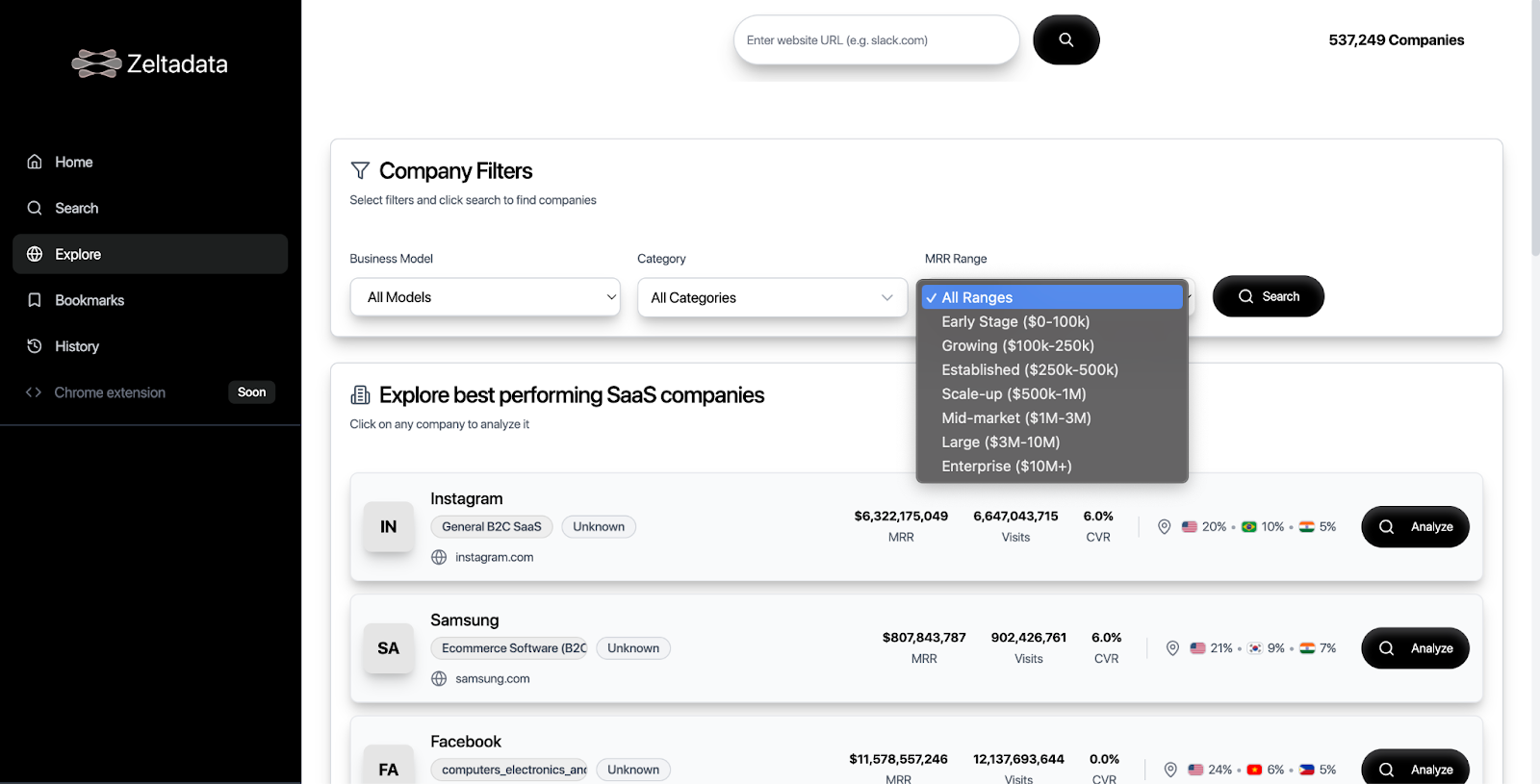

.webp)